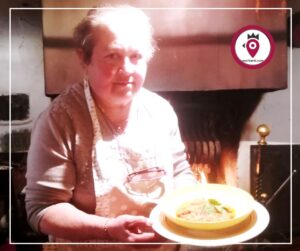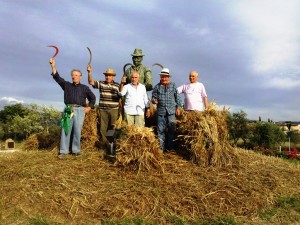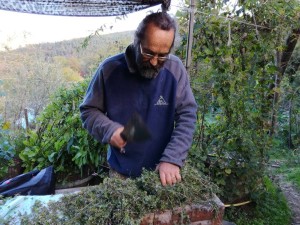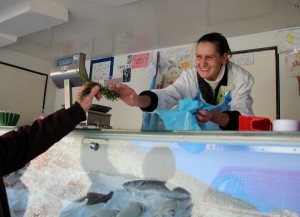Articolo disponibile anche in: Italian
“Curiosity is the most exciting evolutionary stimulus: to see what happens when we eat salami with Nutella like we did when we were young represents the first step in becoming a great gourmand. Hunger is the first vital instinct. Passion for cooking is within us and, on my part, I try to involve the reader”.
This is the meaning of Massimo Guarducci’s first book. Massimo, from Castellina in Chianti, a cooking enthusiast. Blogger online since 2012, he manages a restaurant in Santa Colomba, near the city of Siena.
He is a “cuciniere” as he defines himself according to the canons of his book; always ready to work the stovetop depending on the situation, the season, and the availability of raw materials and ingredients.
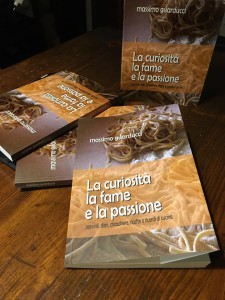 “La curiosità, la fame e la passione – appunti, diari, chiacchiere, ricette e ricordi di cucina” (Curiosities, hunger and passion – notes, diaries, chats, recipes and memories of cooking), recently published, is not easily classified, as suggested in an introduction by professor Gino Melchiorre who chose “diary” as a classification for the book. It contains nostalgic flashbacks and memories of infancy and adolescence: “We occasionally had assorted fried fish with calamari but we also ate it when we went to the beach in Follonica…”.
“La curiosità, la fame e la passione – appunti, diari, chiacchiere, ricette e ricordi di cucina” (Curiosities, hunger and passion – notes, diaries, chats, recipes and memories of cooking), recently published, is not easily classified, as suggested in an introduction by professor Gino Melchiorre who chose “diary” as a classification for the book. It contains nostalgic flashbacks and memories of infancy and adolescence: “We occasionally had assorted fried fish with calamari but we also ate it when we went to the beach in Follonica…”.
Memories of our youth; “when we used to stuff ourselves and went for pizza twice a week with our souped up Fiat 127”. These memories assume historic value, as Guarducci gives the reader the gift of his own culinary heritage.He doesn’t limit himself to food references, but presents the social– cultural context in which certain dishes were created.
In this sense, his book is a tribute to being a Tuscan: to be a son of the earth, profoundly rural, but at the same time living in the cradle of the Renaissance. this teaches us how to be simple and concrete without losing a breath of poetic and aesthetic reflection.
It is also easy for Guarducci, from a writing point of view, to pass from frequent use of dialect, Frenchisms, English, and literary citations; from Dante to Artusi, passing through Marcel Proust and Manuel Vzquez Montalban. From the gastronomic point of view, Guarducci offers a menu of dishes and recipes from the most typical elements of the “cucina povera”, like panzanella and ribollita, to a fancy dish like sweet and sour wild boar with pine nuts and cranberry syrup “which might seem to be an American recipe, but is actually very “Tuscan”, even if it seems like something invented by an avant garde chef”.
Coherently, his strong roots in traditional cooking, which find its maximum expression in the dedication to his mother, Luisa, and in his memory of the “meravigliosi sapori e profumi che mi ha regalato e insegnato…” (the marvelous tastes and odors which she taught me and gave me…)” Guarducci can still find himself in contemporary times, between references to Wikipedia and TV programs like “Orrori da gustare”.
He even uses international cooking instruments like the Chinese wok. We understand that the author is eclectic also by his references to the worlds of cinema and mjsic. When breaking with the formal style of giving titles to paragraphs, he names one “il burro fatto in casa è una figata pazzesca” (home made butter is cool). Here he gives the opposite to a judgment by “Ugo Fantozzi” about the movie “La corazzata Potemkin”.
When he defines garlic, oil and hot pepper as a condiment for pasta as “giro di do” it holds meaning for guitar players. He adds the song “Back in Black” by AC/DC as necessary ingredients for the preparation of linguine with salame and onions.
Guarducci considers cooking a noble art because “it is creative and lets you put your essence, your emotions and your thoughts on a plate, something that will then become part of the person who eats it”.
In the end, he reminds us that it is a means, not an end. “I think that when we sit down at our table with friends, the best thing we can do is not spend too much time cooking, but to prepare as much as possible beforehand and enjoy the company”.
This is a message which encloses the theme about being “Tuscan”, knowing that the quality of life surpasses everything, The book will be presented by its author over the following weeks and is already on sale at “La Magona” and the “Emporio Chianti” in Castellina in Chianti.
Cosimo Ciampoli
